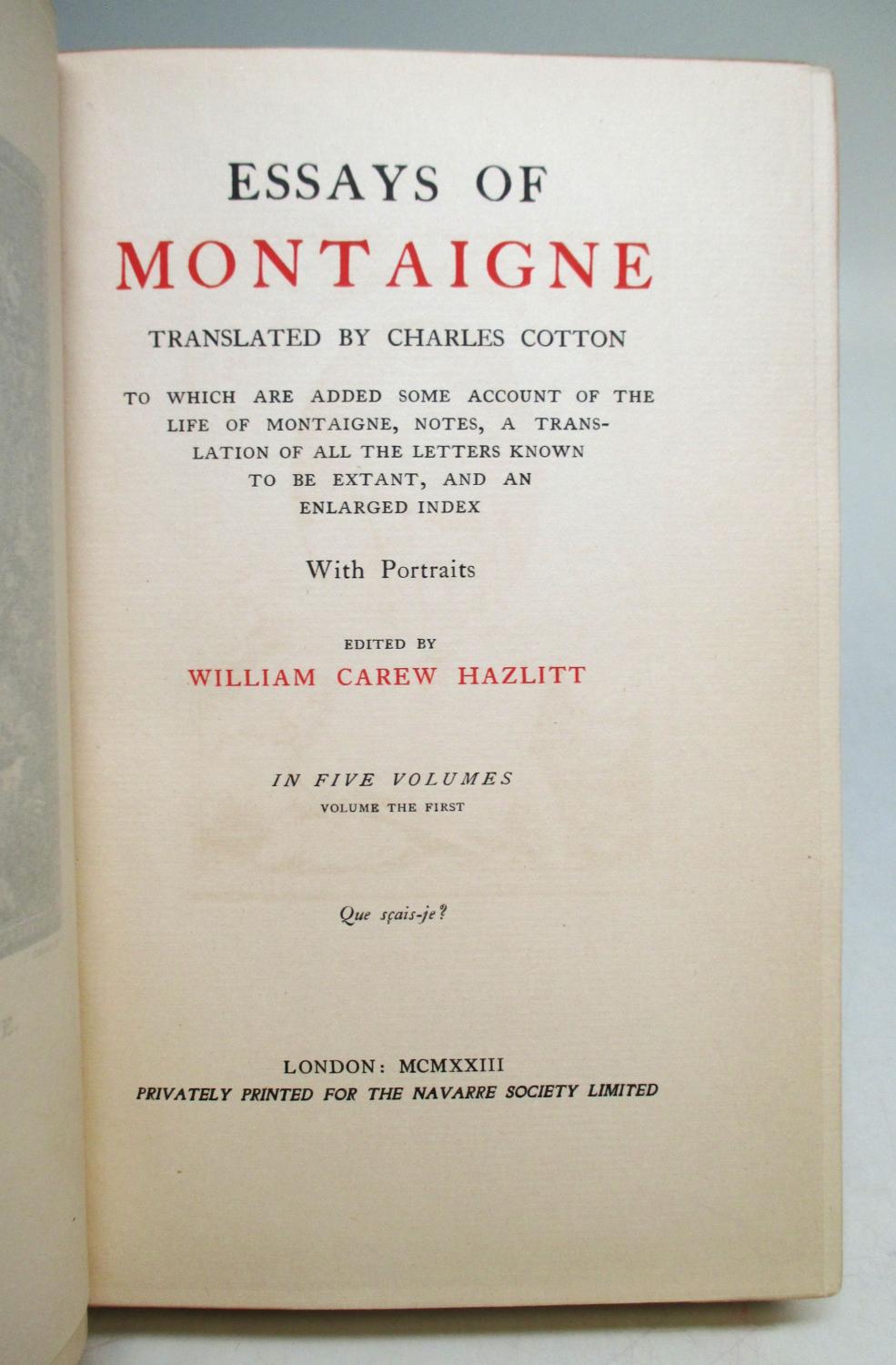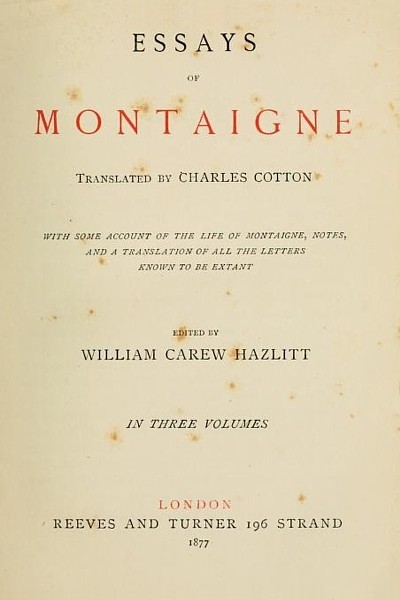
Item Preview
It has been suggested by Donald M. Frame, in his introduction to The Complete Essays of Montaigne that because of Montaigne's "imperious need to communicate", after losing Étienne he began the Essais as a new "means of communication" and that · We cannot do better, in connection with this journey of sympathy, than to repeat the words of Pasquier: “That young lady, allied to several great and noble families of Paris, proposed to herself no other marriage than with her honour, enriched with the knowledge gained from good books, and, beyond all others, from the essays of M. de Montaigne, who making in the year Essays of Montaigne by Montaigne, Michel de, ; Cotton, Charles, ; Hazlitt, William Carew,

Navigation menu
Essays of Montaigne, in 10 vols. This is a 10 volume collection of Montaigne’s famous essays in the 17th century English translation by Charles Cotton. it contains the following essays: Vol. 1: BY DIFFERENT METHODS MEN ARRIVE AT THE SAME END. OF SORROW; OUR AFFECTIONS CARRY THEMSELVES BEYOND US The Essays of Michel de Montaigne. Montaigne saw his age as one of dissimulation, corruption, violence, and hypocrisy, and it is therefore not surprising that the point of departure of the Essays is situated in negativity: the negativity of Montaigne’s recognition of the rule of appearances and of the loss of connection with the truth of being · We cannot do better, in connection with this journey of sympathy, than to repeat the words of Pasquier: “That young lady, allied to several great and noble families of Paris, proposed to herself no other marriage than with her honour, enriched with the knowledge gained from good books, and, beyond all others, from the essays of M. de Montaigne, who making in the year

THE LIFE OF MONTAIGNE
Essays of Montaigne by Montaigne, Michel de, ; Cotton, Charles, ; Hazlitt, William Carew, In Book 1, the first essay, “By Differing Means We Attain the Same End,” describes two ways to win mercy after defeat in battle. The second essay, “Idleness,” explores the problem of a wandering mind. The third, “Through Philosophy We Learn How to Die,” suggests a proper attitude toward death The Bordeaux copy of the Essays is a edition of Michel de Montaigne 's Essais held by the Bibliothèque municipale de Bordeaux. [1] The book contains about manuscript corrections and annotations made by Montaigne between the summer of and the 13 September (date of his death). This unique document sheds light on the way

Philosophy (and writing) as a way of life
It has been suggested by Donald M. Frame, in his introduction to The Complete Essays of Montaigne that because of Montaigne's "imperious need to communicate", after losing Étienne he began the Essais as a new "means of communication" and that Essays of Montaigne, in 10 vols. This is a 10 volume collection of Montaigne’s famous essays in the 17th century English translation by Charles Cotton. it contains the following essays: Vol. 1: BY DIFFERENT METHODS MEN ARRIVE AT THE SAME END. OF SORROW; OUR AFFECTIONS CARRY THEMSELVES BEYOND US The Bordeaux copy of the Essays is a edition of Michel de Montaigne 's Essais held by the Bibliothèque municipale de Bordeaux. [1] The book contains about manuscript corrections and annotations made by Montaigne between the summer of and the 13 September (date of his death). This unique document sheds light on the way

A free-thinking sceptic
In Book 1, the first essay, “By Differing Means We Attain the Same End,” describes two ways to win mercy after defeat in battle. The second essay, “Idleness,” explores the problem of a wandering mind. The third, “Through Philosophy We Learn How to Die,” suggests a proper attitude toward death Essays of Montaigne by Montaigne, Michel de, ; Cotton, Charles, ; Hazlitt, William Carew, · Montaigne’s earlier essay “To philosophise is to learn how to die” is perhaps the clearest exemplar of his indebtedness to this ancient idea of philosophy
No comments:
Post a Comment